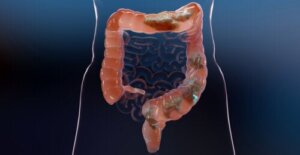Colon Irrigation: Myths and Facts You Need to Know


Written and verified by the doctor Maryel Alvarado Nieto
How well our digestion works depends a lot on the way we eat. The popularity of regular bowel movements has caused those who don’t go to the bathroom frequently to resort to techniques that can help their bowel movements. One such method is colon hydrotherapy or colon irrigation.
Chronic constipation affects 2 to 34% of adults in some societies. So, it is a fairly common condition.
The symptoms associated with constipation lead people to seek ways to produce evacuation. They usually resort to the use of laxatives and enemas, but some turn to more drastic treatments, such as colon irrigation.
What is colon irrigation?
Colon irrigation is a technique in which a tube is inserted through the rectum to irrigate the colon. The purpose of this method is to allow a thorough cleansing of the intestine, eliminating dietary residues that are present in the final portion of the digestive tract.
For this purpose, various pieces of equipment have been designed to facilitate the work. They have adjustable options that provide greater freedom of manipulation to the practitioner.
These devices introduce large quantities of water into the intestine (up to 120 liters). However, it’s also other substances, such as coffee, herbal infusions, and enzymes, are sometimes used.
The machines used for these procedures are usually designed to work with pressures that don’t exceed 120 millibars and maintain a temperature close to body temperature. However, depending on the device, the latter can be adjusted to between 21 and 41 °C.
Colonic irrigation sessions
The approximate duration of a session is 40 minutes, divided into a few short irrigation periods. In total, 40 to 60 irrigations can be performed in a single session, in which about 2 liters of liquid are introduced in each one.
Colon hydrotherapy is performed by a hydrotherapist, who usually has no scientific training, except for the technical training to manipulate the equipment.

Why was colon irrigation intended?
Colonic irrigation appears as a response to an old and controversial theory, which in recent decades has regained popularity: autointoxication. This belief assumes that the large intestine is a simple sewage system and links the retention of digestion waste with disease.
The initial hypothesis is that the putrefaction of these materials produces toxins, which are absorbed by the body. Therefore, constipation was considered a silent enemy, as it allowed feces to remain longer in the intestine.
However, such claims were disproved in the 1920s. Today, colon health has regained importance, only the focus of research is on understanding the interaction of the microbiome with the rest of the body.
We think you may also enjoy reading this article: 5 Aloe Vera Remedies that Will Help You Clean Your Colon
Does colon irrigation have any benefits?
This method has no scientific support and most doctors are against it.
Some see colon irrigation as useful in the preparation of the colon prior to a colonoscopy. Its proponents propose it as a curative technique for a number of conditions, including the following:
- Colitis
- Flatulence
- Diverticulitis
- Constipation
- Irritable colon
- Crohn’s disease
- Intestinal parasitosis
Like this article? You may also like to read: Five Recipes for Detox Salads to Cleanse Your Colon
Hydrotherapists aim to increase their number of clients by proposing colonic irrigation as an effective remedy for the treatment of other conditions. However, there’s no scientific evidence to support these claims, but there’s also no legislation to protect the patient from such claims.
The conditions they claim to treat include the following:
- Sinusitis and other respiratory disorders
- Recurrent headaches and migraine
- Halitosis or bad breath
- Mental disorders
- Skin problems
- Various allergies
- Alcoholism
What does the science say?
In recent decades, some research has attempted to discover the real benefits of colon hydrotherapy. For example, in a study of patients with irritable bowel syndrome, colonic irrigation equipment that is approved by the Taiwanese health agency was used.
The proposed sessions were less drastic, with much lower irrigation rates than those described in conventional sessions. The result of the research is that there was improvement in the symptomatology of these patients.
However, in the same study they describe the limitations of their findings, as it was a small population sample and the follow-up time of the patients was short. On the other hand, one of the indicators of effectiveness was subjective, and could be the result of a placebo effect.
Likewise, in another series of investigations carried out with patients presenting chronic constipation or diarrhea, an improvement in symptoms was also achieved. In any case, the group of people did not exceed 40.
The risks of colon irrigation
Although those who practice colon irrigation propose it as a harmless technique, this is far from the truth. The greatest risk to which a person who resorts to a hydrotherapist is exposed is intestinal perforation, which can trigger sepsis and water and electrolyte imbalance. Both conditions are fatal.
So, the safety of colon hydrotherapy is just a myth. In addition, other risks include cross-contamination, post-session gastrointestinal symptoms (nausea, vomiting, or diarrhea), abdominal fullness, and anal pain.

Contraindications of colon irrigation
There’s an endless list of people who shouldn’t go to get a colon irrigation. Among these contraindications are the following:
- Pregnancy
- Neoplasms
- Rectal prolapse
- Abdominal hernias
- Digestive hemorrhages
- Anal fissures and fistulas
- Hemorrhoidal disease
- History of irradiation
- Arterial hypertension and heart disease
A controversial procedure
Colonic irrigation may have potential utility in the management of certain patients with conditions affecting the gastrointestinal tract. In particular, evacuatory disorders.
However, this resource should be considered only in patients in whom medical treatment has not been effective. Likewise, the technique should be considered before opting for any surgical procedure, since it’s less invasive. It’s also crucial to talk to your doctor before getting this procedure.
However, the recommendations for the practice of colonic hydrotherapy are that the equipment should be for individual use only and that its parts should be disposable, that filtered tap water should be used instead of other substances, and that the quantities of liquid should be reduced. Training in the use of these devices is absolutely crucial to avoid serious adverse effects.
It’s vitally important that anyone who gets this procedure done maintain close medical follow-up. Likewise, much more research is needed in this regard.
Overall, it should be clear that this is a technique that requires careful consideration of a risk/benefit factor to be considered as an option. On the contrary, we may be once again believing an old myth.
All cited sources were thoroughly reviewed by our team to ensure their quality, reliability, currency, and validity. The bibliography of this article was considered reliable and of academic or scientific accuracy.
- Araujo, M.; Kraemer, P.; Evidencia Científica sobre la Efectividad y Seguridad de la Hidroterapia Colónica y la Mesoterapia; Unidad de Evaluación de Tecnologías de Salud; 2006.
- Ernst, E.; Colonic Irrigation and the Theory of Autoitoxication: a Triumph of Ignorance over Science; Journal of Clinical Gastroenterology; 24 (4): 196 – 198; 1997.
- Jarvis, W.; Colonic Irrigation; National Council Against Fraud; 2000.
- Barret, S.; Gastrointestinal Quackery: Colonics, Laxatives and More; Quackwatch; 2010.
- Hsu, H.; Leung, W.; Hu, G.; Treatment of Irritable Bowel Syndrome with a Novel Colonic Irrigation System: a Pilot Study; Techniques in Coloproctology; 20: 551 – 557; 2016.
- Koch, S.; Melenhorst, J.; van Gemert, W.; Baeten, C.; Prospective Study of Colonic Irrigation for the Treatment of Defaecation Disorders; British Journal of Surgery; 95 (Issue 10): 1273 – 1279; 2008.
- Manon, M.; Autointoxication and Historical Precursors of the Microbiome–Gut–Brain Axis; Microbial Ecology in Health and Disease; 29 (Issue 2); 2018.
- Transcom S.L. San Sebastián; Hidroterapia del Intestino Grueso con Hydro-Colon; Natura Medicatrix; 36; 1994.
This text is provided for informational purposes only and does not replace consultation with a professional. If in doubt, consult your specialist.








